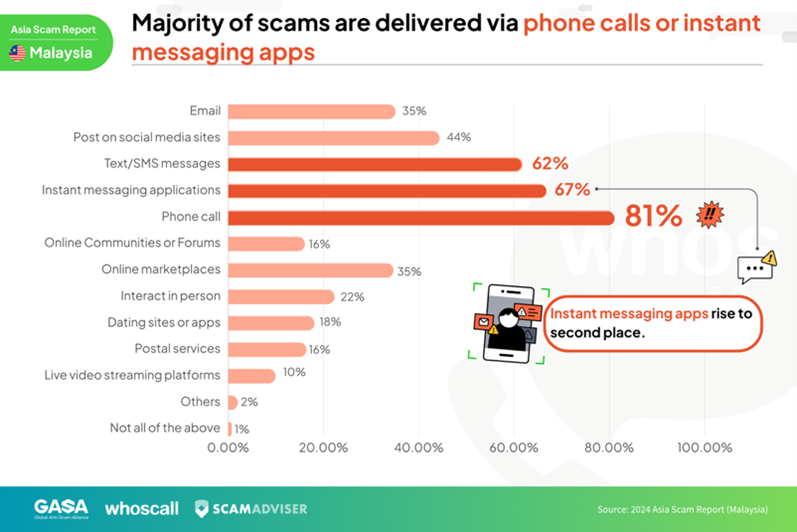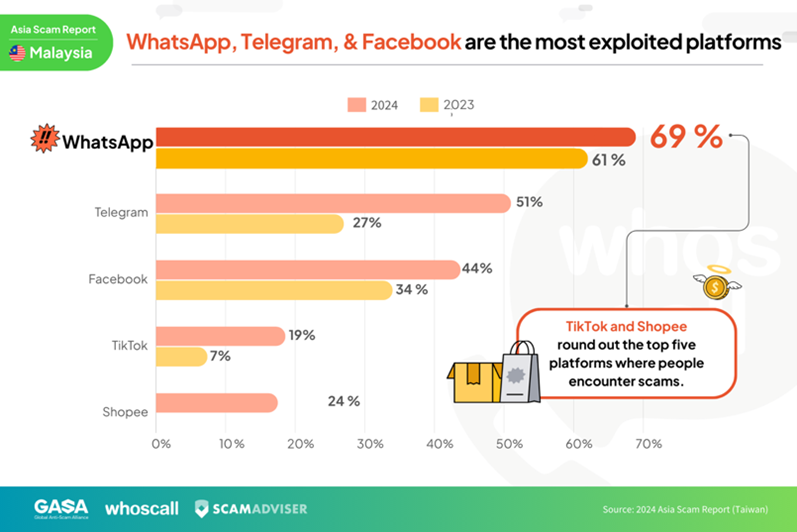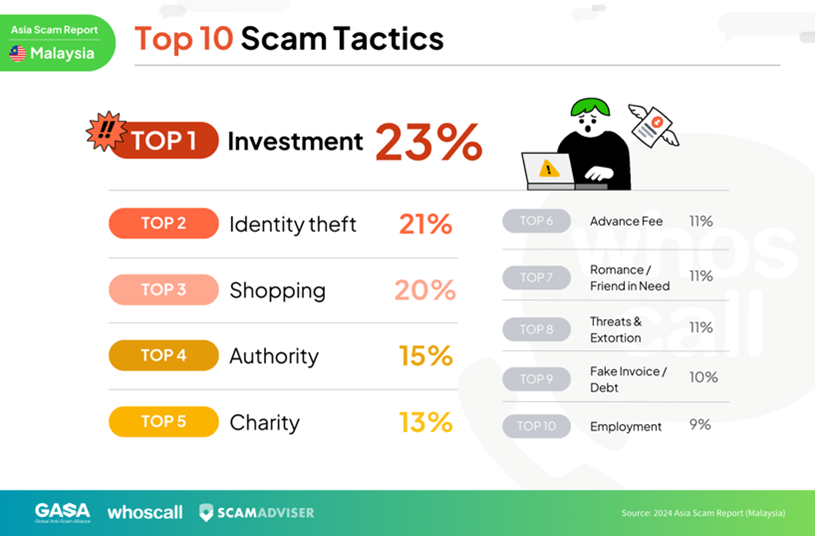GASA & Whoscall: Malaysians Lose USD $12.8 Billion To Scams In A Year, Equivalent To 3% Of The Nation’s GDP

Scams continue to inflict severe financial and emotional damage in Malaysia, with the latest State of Scam Report 2024 revealing that Malaysians lost an alarming USD12.8 billion to scams in the past year. This loss represents 3% of the country’s GDP, underscoring the urgent need for stronger countermeasures.
The State of Scam Report 2024, conducted by the Global Anti-Scam Alliance (GASA) in collaboration with Whoscall and Feedzai, surveyed 1,202 Malaysians, providing critical insights into the nation’s ongoing battle with fraudulent schemes. Alarmingly, 70% of scam victims did not report their cases to the authorities, a 5% drop from the previous year, highlighting growing scepticism regarding the effectiveness of reporting processes. From those surveyed, 32% of the respondents have experienced loss of money from scams.
70% Of Scam Victims In Malaysia Do Not Report Incidents To Authorities

The rise of AI-powered scams is particularly troubling, as 25% of Malaysians expressed uncertainty about whether artificial intelligence was involved in the scams they encountered. This gap in awareness leaves Malaysians vulnerable to more sophisticated scams that exploit advanced technology to deceive victims, such as deepfake videos and voice imitation, making them harder to detect.

Scams have become a daily concern for many Malaysians. The report found that 74% of respondents encountered scams at least once a month, with 43% noting an increase in scam attempts over the past year. Common delivery methods include phone calls, instant messaging apps, and social media platforms such as WhatsApp, Telegram, and Facebook, where scammers have become increasingly active. Notably, text and SMS scams have surged by 8% compared to 2023.


The emotional toll on victims is profound, with 57% reporting a strong emotional impact due to their experiences. This distress is compounded by financial losses; the average loss per victim was reported at USD2,726, with only 2% managing to fully recover their funds – a sharp decline from the previous year’s 8%.
Commenting on the report, Manwoo Joo, Chief Operating Officer of Gogolook emphasised the importance of proactive fraud prevention in today’s digital landscape. “With advanced anti-fraud applications like Whoscall serving as the first line of defence against scammers, we can significantly reduce the risk of falling victim to scams. Whoscall is actively collaborating with the local government such as Royal Police Malaysia (PDRM) and CyberSecurity Malaysia to strengthen efforts in tackling scammers and enhancing public protection. We are continuously exploring advancements in technology, including AI-driven features, to stay ahead of evolving scam tactics. Our goal is to leverage cutting-edge solutions to provide Malaysians with the tools they need to identify and stop scams before they cause harm.
Whoscall is the only trusted anti-scam app approved by the Royal Malaysia Police (PDRM) and recently appointed by CyberSecurity Malaysia as well as Pos Malaysia as their Anti-Scam strategic partner. Expanding beyond just calls and text messages, Whoscall recently introduced its latest feature, Auto Web Checker. This new tool provides Malaysians with real-time warnings when users accidentally visit scam websites, helping to prevent personal data leakage and account theft.

The report also highlights:
- Speed of Scams: 33% of scams are completed within 24 hours of first contact while 20% reported that the scam was over in minutes. This highlighted the importance of being alert at all times as scammers are often opportunists.
- Top Scam Tactics: At 23%, investment scams are the most common type of scam in Malaysia, with identity theft closely following at 21%. Shopping scams came in a close third at 20%.
- Trust Erosion: As a result of these experiences, 63% of Malaysians reported decreased trust in online platforms and digital transactions.

In light of these findings, experts urge for enhanced public education on recognising and reporting scams, improved transparency in reporting processes, and stronger law enforcement responses. The need for comprehensive strategies involving technology and community engagement has never been more critical as Malaysia grapples with this pervasive issue.
Additionally, GASA and Gogolook have announced the first Global Anti-Scam Summit (GASS) in SouthEast Asia, set to take place at Suntec Singapore on 21-22 October 2024. Supported by the Singapore government, the summit is the largest gathering of anti-scam stakeholders across sectors which will bring together experts from GASA, major global companies like Amazon, Google, Gogolook, Mastercard, and Meta, as well as officials from law enforcement, financial authorities, and non-profit organisations.
Participants from across Australia, New Zealand, Thailand, India, Malaysia, Singapore, Taiwan, Hong Kong, Japan, the Philippines but also the Netherlands, the United Kingdom, the United States and beyond will focus on the theme “The Network to Defeat a Network,” aiming to foster collaboration and develop strategies to protect consumers from scams. The GASS will also unveil the latest findings from the Asia Scam Report, aimed at raising public awareness of digital scams and laying the groundwork for future policy development and advocacy in global anti-scam initiatives and AI applications. In addition to the Asia Scam Report, individual country reports will also be distributed, offering an in-depth exploration of the scam landscape in specific nations.
To be part of the Global Anti-Scam Summit Singapore Chapter, please visit the official website.
Download the Full Whoscall Asia Scam Report – The State of Scams in Malaysia here.
Understand how Whoscall can help prevent scams by going to this link.
We invite all Malaysians to download Whoscall in the fight against scams and protect our community together.




